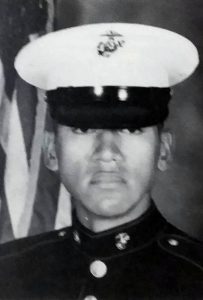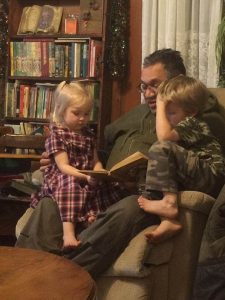Ten years ago, you wouldn’t have wanted to get on the wrong side of Paul Lansing. An ex-Marine who’d trained for 35 years in martial arts, he was a hulk of a guy with a demeanor that said, “Don’t mess with me.” Nowadays, if you were to see him with his neighbor’s children cuddled up to him while he reads Amelia Bedelia, you would hardly recognize him as the same person. This man who once lived for fighting and combat now considers himself a nonresistant follower of Jesus. So what changed?
Paul was born in rural Nebraska to a German American father and a Mexican mother. “The first time I got sent home for fighting I was in kindergarten,” Paul says. “I had been beating up kids smaller than myself and my dad told me, ‘If you’re gonna fight someone, fight someone bigger than yourself.’ A week later, I was sent home for fighting a 6th grader!”
Paul found out early in his school career that being half Mexican singled him out for mistreatment. One day his first-grade teacher, Mrs. Blankel, asked where his mother was from. Paul, too young to understand countries and states, told her he didn’t know the planet. While many people would chuckle a little at such a statement, Mrs. Blankel laughed derisively. “She had the other students join in, laugh at me,” Paul says. “I still remember that day.”
From then on, things got worse. Groups of kids ganged up on him several times a week, and someone would want to beat him up almost every day for the crime of being Mexican. “At first, you’re kinda scared,” says Paul. “But I found out if you cried or if you begged for mercy, it only got worse. Around the time I was in 2nd grade, I swore I’d never cry again or ask for mercy. So I fought.”
He remembers one instance when a whole group of kids lined up beside the school bus, taunting him and telling him they were going to whup him. Paul looked to the bus driver for help, but he just leaned back in his seat with a smirk on his face that said, “I’m going to enjoy this.” From that experience and others like it, Paul learned he couldn’t count on anyone for help. He was alone.
His reaction? “I went out swinging, and I went down swinging,” he says. “It happened so many times, I started getting good at it.” By the time he got out of high school, Paul figures he’d been in three to five thousand fights.
Paul enrolled in a military academy for high school and college. While in high school, he saw a bully who was second in state wrestling beating up a slim junior high cadet. As Paul tells the story: “I went over there and said ‘Knock it off.’ And then he attacked me. He took me down, and I threw him, and then he got on top of me, and I told him to get off. He wouldn’t do it, so I decked him. One punch and he was knocked out. His eye was shut for a couple months and from there on I had a hero status. Everyone would come up and just thank me.”
Paul hated seeing the “little guys or girls” get beat up and soon became known for beating up the bullies. The other students started calling him “the bully of bullies.” “Eventually,” Paul says, “some of the girls I knew…I guess they just wanted to tell me their story, you know, talk to somebody. I heard from them horrible stories—much, much, much worse than anything I’d gone through. And I realized I didn’t have it too bad.”

Paul dropped out of the military academy after the first year of college to enroll in the Marines. He became a sniper and loved it. In his late twenties, he left the Marines—just two years before Desert Storm happened—to work a construction job. He never did get to fight in a war, but at age 13 he’d joined the Army Martial Arts League, and he continued there for 35 years, eventually becoming an officer. He earned four black belts and got to know some big names in the martial arts community, where he describes himself as “proficient but not great.” Great or not, he was once attacked by 30 guys at once and was able to hold his own.
After leaving the Marines, Paul continued his physical training. He lifted weights two hours a day, ran 33 miles a week, rode his bike everywhere, did 2 aerobic-paced martial arts classes a night, and practiced an additional 20 hours of martial arts on his own every week. Even at work—first in construction and later as data processor—he practiced his stances.
Paul frequently got dragged into fights, though he rarely started them. “I had a fierce appearance, plus huge muscles,” Paul says. “I was one of those guys that if somebody beat me, they could count it a great victory. If they lost, they could always say, ‘Well, look at that guy!’” Paul figures he was involved in several thousand fights in his adult years, including several hundred in the ring.
By his late thirties and early forties, the stories he’d heard and the brutality he’d experienced had worn out his spirit. He grew so sick of people, he turned his back on the world. “I got so sick of people I’d do my grocery shopping late at night because I didn’t want to be around anyone. I went to work and that was about it. I got to where I really hated people. I became a hermit. I didn’t go anywhere, I didn’t associate with anyone, I didn’t do anything. I just sat at home and thought about what a sick world we live in.”
In his upper forties, Paul took a job as an electrician and made a new friend, Gene. As they got to know each other over the next few years, they would often sit around talking after work. Gene was a dedicated Christian, and sometimes their conversation turned to God. Paul had never had anything to do with God, believing it was just a way for people to explain things they didn’t understand. But he found Gene’s perspective interesting and thought that now and then he made a valid point.
More than once, Gene invited him to church. “Yeah right, as if I’m going to go to church,” was Paul’s response. But one night, Gene invited him to the children’s Christmas program, and Paul thought, “What can it hurt? I got nothing going.”
“That night,” Paul says, “I saw the hand of God, the light of God. I saw him working through the children. From that night on, I gave my life to the Lord.” That very same night, he got rid of his books, his music, his movies, and his TV and gave up his fighting and martial arts. “I dropped everything, and I never looked back. I knew from that day on that He exists and there’s nothing else that matters.”
“Life has changed so much for me,” Paul says. “I’m doing things I would have never done.” That includes studying the Bible, participating in street meetings with his church group, treating homeless people with respect and buying them lunch, explaining the gospel and Biblical teaching in online conversations, and even reading stories to his neighbor’s children.
Not every habit changed overnight. Smoking cigarettes was one habit he found almost impossible to break. “I decided smoking is polluting the temple of the Holy Spirit,” Paul says, “so I decided I was going to quit. I crumpled up my pack and tossed it away, and said, ‘Okay, we’re going cold turkey.’ A week later I’m smoking like a fiend. A week later I’m ready to try it again. I crumple up my pack, toss it in the trash, and a week later I’m smoking like a fiend. This goes along for a year and a half, and I cannot stop. One day Gene asked me, ‘How you doing with the cigarettes?’ and I told him. He said, ‘Let’s pray about it.’ So we prayed about it. And that night I had victory and have ever since.”
That experience taught him the importance of depending on God. “Back when I realized the bus driver wasn’t going to help me, I learned to handle things alone, and I handled things by myself for all those years. Handing my problems over to God is a huge step for me. But I know that God wants me to, and so I do.
“Trusting him, that takes faith. I didn’t have that. Everything was me. I was proud. I look at my old pictures, I got this stuck up look, everything was me, by me, for me… me, me, me, me. But now it’s for God. He’s the center, not me. And it took a lot to get to that point. I never bowed to anyone before I met God.”

He now lives just two blocks from Gene and his family, and they attend church together every Sunday. He loves spending time with the children he once would have ignored and enjoys watching them grow up. Along with Gene, he continues to remain active in sharing his faith, whether that’s in street meetings or jail ministry or online forums.
“Even today if someone touches me on the shoulder from behind, I have to resist an urge not to prepare to defend,” Paul says—but he has chosen to lay aside those defense instincts and use Christ’s peaceful response instead. “I still consider myself a warrior,” he says. “But my weapons are no longer carnal.”
***
This article joins a series of posts I call In Every Life a Story. I plan to publish a new story for this series every 6 weeks or so. Do you have a story or know of someone who has a story to encourage and inspire others? Contact me at lucindajkinsinger@gmail.com. Although many stories will feature Christian themes, I hope to hear from people of many faiths and persuasions. Whoever you are, please get in touch.

I never tire of hearing of the work of God in the hearts of men… Bless you!
Thank you for sharing this!
this is a typical presentation of Christianity as some sweetness and light. It’s always convenient for Christians to forget their Jesus advocates for those who wont’ accept him as king to be murdered and who kills all non-christians in the nonsense of Revelation (all the while this god is working with Satan).
There are victories and failures in life. Christ’s life was one of victory, whereas judas Iscariot was one of failure. It is edifying to read of victory. And yes, the failures are the property of Satan.
Appreciated the article. Thanks for sharing.